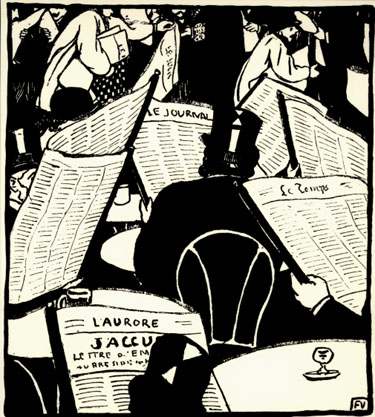image banks
--l'assiette au beurre
--Les Quatre Saisons de la Kultur

L'Aurore, January 13 1898
Excerpts from J'Accuse: A Letter to M. Félix Faure,
President of the Republic Monsieur le Président:
Will you allow me, out of my gratitude for the gracious welcome
with which you once received me, to covey my concern for your well-earned
reputation, and to tell you that the good fortune of your glory is now
threatened by the most shameful and indelible of stains?
You have come unscathed through scandalous calumnies and you
have won the people's hearts. You are the shining star of the patriotic
apotheosis the Russian alliance represents for France. Soon you will preside
over the solemn triumph of a World's Fair that will be the crowning achievement
of our great century of work, truth and liberty. But how your name —I was
about to say, your reign— is besmirched by this abominable Dreyfus Affair
! Obeying orders, a court martial has just dared to acquit this Esterhazy
in a supreme slap in the face of truth and justice. It is all over; France
bears on her cheek the stain of this disgrace, and History will record
that it was under your Presidency that such a crime against society was
committed.
Since they have dared to do this, I too shall dare, I shall tell
the truth that I swore I would tell, if the judicial system, once alerted,
did not tell the truth, the whole truth. It is my duty to speak; I will
not be a silent accomplice. My nights would be haunted by the spectre of
that far-off, innocent man who atones for a crime he did not commit
through the most hideous torture.
So it is to you, M. Ie Président, that I will shout out
the truth, with the all energetic revulsion of an honest citizen. I believe
in your honor, I am convinced that you do not know the truth. And to whom
should I denounce the pack of evil schemers who are the truly guilty parties
if not to you, the first of all judges in our country?
(...)
But this letter is already long, M. le Président, and
it is time to conclude.
I accuse Lt-Col du Paty de Clam of having been the fiendish agent
of a miscarriage of justice, unwittingly, I would like to believe, and
then of having defended this nefarious enterprise for the past three years
through the most absurd and guilty machinations.
I accuse General Mercier of having been at the least the weak
witted accomplice of one of the greatest iniquities of this century.
I accuse General Billot of having had in his hands proof positive
that Dreyfus was innocent, of having suppressed it, and of having
committed this crime against justice and against humanity with the political
objective of saving a compromised General Staff.
I accuse Generals de Boisdeffre and Gonse of having been the
accomplices of this same crime, the first out of clerical conviction,
no doubt, and the second perhaps acting out of the esprit de corps
which considers the War Department the impregnable ark of the covenant.
I accuse General de Pellieux and Major Ravary of having conducted
a criminal investigation, by which I mean a monstrously one-sided inquiry,
for which Ravary's report constitutes an imperishable monument of naive
audacity.
I accuse the three handwriting experts, Messrs Belhomme, Varinard
and Couard, of having submitted fraudulent and deceitful reports - unless
a medical examination finds that they have bad eyesight as well as poor
judgment !
I accuse the War Department of having waged an abominable campaign
in the press, in particular in L'Eclair and L'Echo de Paris, so as to divert
public opinion as a cover for their crime.
Finally, I accuse the first court martial of having violated
the law by pronouncing a defendant guilty on the basis of a document which
remained secret, and I accuse the second court martial of having covered
up that illegal action under orders, by committing in its turn the judicial
crime of knowingly acquitting a guilty man.
In making these accusations, I am not unaware that I open myself to
charges under Articles 30 and 31 of the law on the press of July 29 , 1881
, which punish libellous acts. I deliberately expose myself to that law.
As for those I accuse here, I do not know them; I have never
seen them; I bear them neither rancour nor hatred. They are
for me no more than mere entities, the representatives of social malfeasance.
And my action here is but the revolutionary means to hasten the explosion
of truth and justice.
I have but one passion: that light be shed, in the name of a
humanity which has suffered so much and has the right to happiness. My
burning protest cries out from the depths of my soul. Let them dare to
summon me before a court of law! Let the inquiry be held in broad daylight!
I am waiting.
Please accept, M. le Président, the assurance of my most
profound respect.
For the full French text of J’accuse, please go to: http://www.liberation.com/manifeste/jaccuse.html